
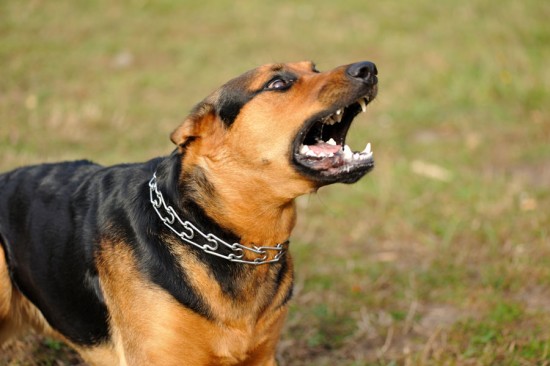
In this context, I'm referring to dogs who are deemed to be aggressive to people - for dogs who are aggressive to other dogs, refer to the article "When Dogs Don't Get Along Together". And by aggressive, I'm talking about growling, snarling and biting. When this happens, there is always a reason. The reason may not be immediately obvious and the incident may seem to be out of the blue, but you can be sure that from the dog's point of view, there is a reason - it's a matter of recognising and understanding it. The common causes for aggression are fear, pain, self-defence or asserting authority over a junior pack member. It often boils down to a dog not knowing how to deal with a scary or confusing situation. On rare occasions there may be a medical cause - a personality change due to something serious such as a brain tumour. But let's concentrate on the behavioural causes that we can do something about.
The only way a dog knows to show his displeasure is by using his teeth - showing them in a snarl or growl, or using them in a bite. The rest of the body language is important too - raised hackles, a tucked in or slowly waving tail for example. A growl is a warning and means "back off or I will bite" so ignore it at your peril. A bite is any contact between a dog's teeth and your skin or clothing (or a serious attempt to do so). Whether you call it mouthing, snapping or nipping, a bite is a bite and should be taken seriously. At one extreme, there are people who ignore it or dismiss it because the dog is small or "only playing" - would they be so forgiving with a big dog? At the other extreme there are those people who won't tolerate any biting and would rather have the dog rehomed or put down after the first offence. But by understanding why dogs bite, it can be dealt with so it doesn't happen again and without the dog having to be rehomed or killed for reacting in a natural canine way. Incidentally, if you do have a dog who has been aggressive and you decide to rehome it, please be honest with the rescue organisation or new owner so they know what they are dealing with, and to prevent future problems - it's only fair on them and the dog.
Dogs are pack animals and look on their human family as their pack. All packs need leadership and if it isn't clear to a dog who is leader of his pack (in a way he understands, not necessarily the same way that we think of it) he will try to do that job himself, and that's where problems can start. A dog trying to deal with things in a canine way in a human world doesn't always work.
Here are some golden rules to avoid conflict with your dog:
Respect personal space. Dogs expect this so always invite a dog to you - whether for fuss, treats, play, grooming - anything. Similarly, expect dogs to respect your personal space too. So when your dog comes to you uninvited, ignore him until you choose to call him to you. The saying "let sleeping dogs lie" is very true. Leave dogs who are eating or sleeping well alone. And don't approach a dog you don't know, even if they look friendly. Invite them to you first.
Never, ever take food away from your dog. Especially when it's food you've given him in the first place. This applies to treats, bones, chews as well as food in a bowl. But do remove uneaten food, chews etc when he's no longer interested and has walked away from it. See the "Dogs and Food" item. In an emergency, if your dog has stolen something and you have to retrieve it, you need to realise that he will protect his prize. So swap it for something else rather than get into a tug of war which you are unlikely to win safely.
Pick your battles. If your dog has something he shouldn't have (which is not food), this is still a trophy he will want to guard and protect. Do you really have to get it back? Ignoring your dog and walking away might be enough to make him lose interest and give up the game. But if absolutely necessary, try swapping the prize for something else rather than get into a fight.
Expect your dog to treat your furniture with respect too. Whether your dog is allowed on the furniture is entirely up to you, but treat it as a privilege. But when you're already there, he should only join you when invited - and he should leave when asked too. If this is a problem, eg your dog hogs the furniture and won't let anyone else near or refuses to move when asked, stop your dog getting there in the first place - restrict his access to certain rooms or block his way so he can't get to the sofa or bed.
Don't let play get out of hand. When you are playing with your dog, you should initiate it. But you also choose when to end it and if you know your dog has a tendency to get carried away and starts grabbing at hands etc, cut the game short before it gets to that point. This might mean you can only play for a few seconds at a time, but your dog will learn that play is on your terms, not his. Avoid tug games as these can lead to aggression - a dog always plays to win, as if it's a real situation. So to avoid problems, play something else instead or perhaps use the time to teach your dog a trick. Playtime can then be a positive thing rather than a potential conflict.
Don't be aggressive yourself. There should be no need to ever shout at your dog. If your dog doesn't do as you ask, it's not because he can't hear you (unless he genuinely has a hearing problem), it's because he just doesn't see why he should. Learn a training method which is calm and non-confrontational. Actions such as putting your face up close to his, grabbing, shaking or smacking will ultimately end in disaster - your dog will come to fear you and fearful dogs use aggression to defend themselves.
Always keep calm. No matter what's going on, take a deep breath and keep your voice and actions calm and under control. This is how a pack leader behaves and as soon as you lose your cool, you will also lose your dog's respect. The ultimate insult for a dog is to be ignored by the rest of the pack, particularly the leader. So when your dog does something wrong, leave him on his own for a few minutes. Either remove him to another room (without speaking as you do so) or, if this might cause a problem in itself, walk away and leave him where he is. As well as showing your disapproval this also allows time for you both to calm down - similar to a "time out" for children.
If your dog is aggressive, professional help is available. Look for someone who offers a non-aggressive solution, without gadgets. Dog-human aggression shouldn't be dismissed, can be helped and doesn't have to mean the end of the road for a dog who is ultimately just confused.
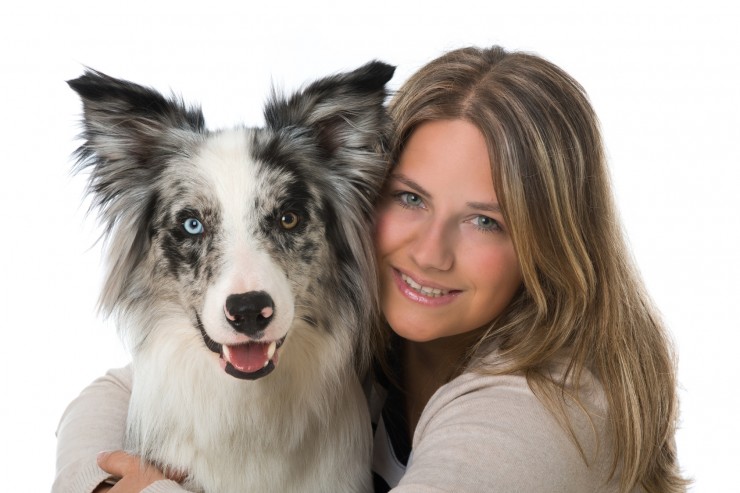 5 Common Beauty Products And Activities That Can Upset Your Dog
5 Common Beauty P
5 Common Beauty Products And Activities That Can Upset Your Dog
5 Common Beauty P
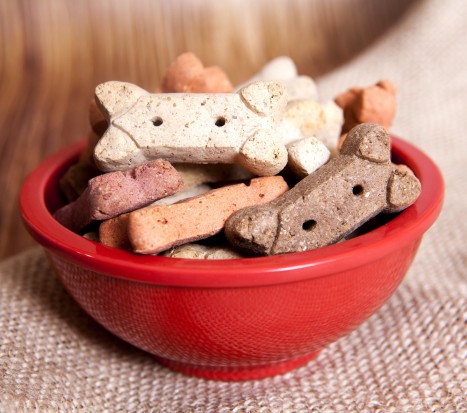 Tips For Safe Home Cooking For Dogs
Tips For Safe Hom
Tips For Safe Home Cooking For Dogs
Tips For Safe Hom
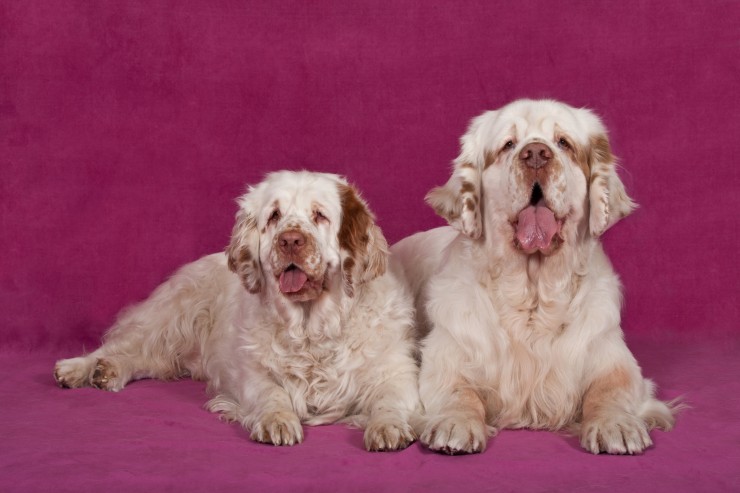 Clumber Spaniels And Dry Eye
Clumber Spaniels
Clumber Spaniels And Dry Eye
Clumber Spaniels
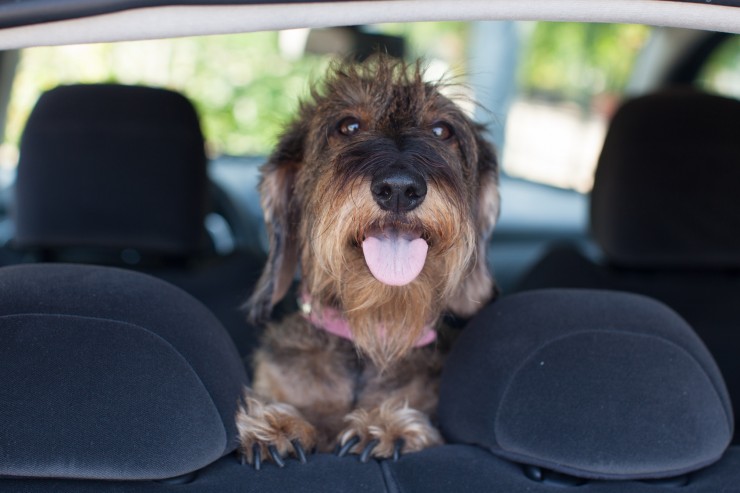 What To Look For When Buying A New Car With Your Dog In Mind
What To Look For
What To Look For When Buying A New Car With Your Dog In Mind
What To Look For
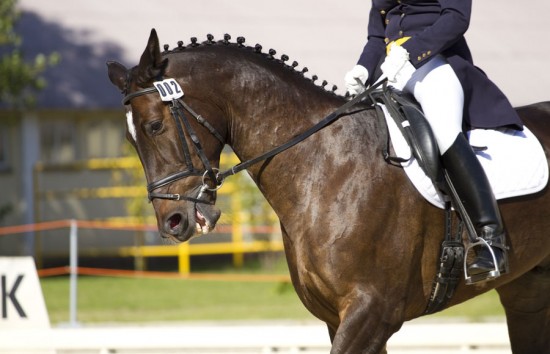 Competing In Your First Horse Show
Competing In Your
Competing In Your First Horse Show
Competing In Your
Copyright © 2005-2016 Pet Information All Rights Reserved
Contact us: www162date@outlook.com